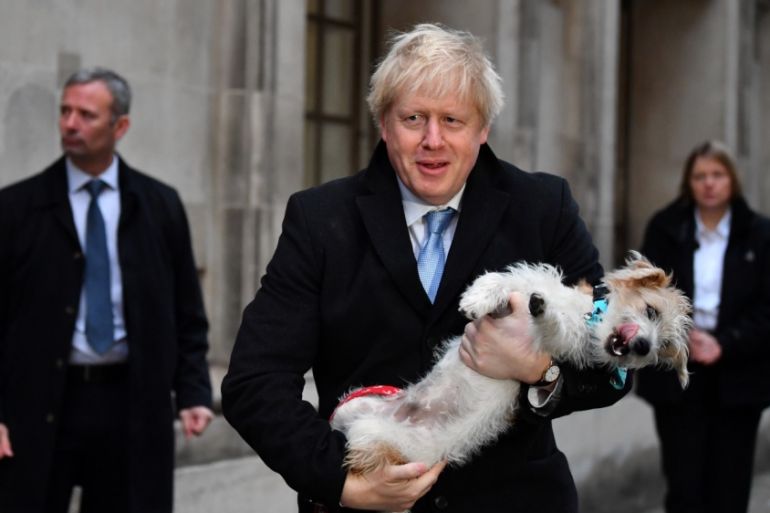British pound soars as Conservatives take the lead in UK polls
A strong win by Prime Minister Boris Johnson will provide more certainty of a Brexit deal and the clarity markets want.

The British pound soared to its highest level in more than two years on Thursday as Prime Minister Boris Johnson‘s Conservative Party looked set for a big parliamentary majority that markets believe means an orderly exit from the European Union.
Sterling’s dramatic gains saw it reach a 19-month high versus the United States dollar and its strongest levels against the euro since shortly after the 2016 Brexit referendum.
Keep reading
list of 3 itemsUK election exit poll predicts Conservative majority
Global markets rise on hopes of progress on US-China trade deal
Its 2.5 percent jump versus the US dollar put it on course for one of its biggest one-day gains since the 1990s.
Chastened by three-and-a-half years of political instability in the United Kingdom, investors have seized on the likelihood of a decisive Conservative majority, believing it will enable Johnson to deliver Brexit with his withdrawal agreement in January, ending any residual no-deal exit fears.
“Just as Boris Johnson was desperately seeking his majority, this result would give the markets their ultimate wish: clarity,” said Dean Turner, economist at UBS Wealth Management.
The exit poll survey showed Johnson’s Conservatives would win 368 seats in the 650-seat parliament – the biggest Conservative national election win since Margaret Thatcher’s 1987 triumph.
If the exit poll is accurate, Johnson will move swiftly to ratify the Brexit deal he struck with the EU so that the UK can leave on January 31.
The pound rocketed as much as 2.5 percent to $1.3516 – its highest since May 2018. It later settled at $1.3459.
Against the euro, sterling rose to 82.80 pence, up 2 percent on the day, leaving the pound at levels last seen in July 2016, shortly after the Brexit referendum that hammered the currency. The pound traded about 76 pence per euro before the June 2016 Brexit vote.
“Sterling has moved aggressively. I would anticipate we would get a decent rise in UK equities in the morning, too,” said Peter Kinsella, Global Head of FX Strategy at UBP.
He said the move was a “relief rally” that the Labour Party under Jeremy Corbyn was unlikely to win and reflected the size of the majority the Conservatives looked set to claim.
The pound could move towards $1.37 in the coming weeks as investors who have under-owned UK assets for the past few years return, Kinsella added.
FTSE 100 futures fell 0.3 percent in early trading. The exporter-heavy FTSE 100 tends to weaken when sterling rallies.
Corbyn’s nationalisation plans have weighed on UK domestic stocks, and energy and transport shares were tipped by analysts to climb when the stock exchange opened on Friday.
Yields on British government bonds are set to rise as investors buy into riskier assets like stocks.
Sterling traders at banks and investment firms are working through the night as results of the election trickle in, with the bulk of parliamentary seats to be declared between 02:00 and 04:00 GMT.
Broader global markets rallied on Thursday, boosted by both the likely UK election result and reports a last-gasp trade deal had averted new United States tariffs on China.
Brexit not done
Political uncertainty has dogged the performance of British assets and the pound since the referendum as investors fretted about the damage a departure from the EU would cause the UK economy.
Markets’ enthusiasm for a Conservative victory under Johnson contrasts with mid-2019, when the pound slumped as investors worried the UK was headed for a disorderly and economically damaging no-deal exit from the EU under his leadership.
But Johnson subsequently secured a new agreement with Brussels and then called a snap election after accusing Parliament of frustrating his plans.
The face of the “Leave” campaign in the 2016 referendum, Johnson fought the election under the slogan of “get Brexit done”, promising to end the deadlock and spend more on health, education and the police.
The opposition Labour Party has promised the public a second Brexit referendum.
“The biggest hope from an economic perspective will be clarity over Brexit in the near term, which should prompt a modest recovery in activity,” said UBS’ economist Turner.
“However, Brexit isn’t yet really ‘done’, and attention will quickly turn to the future trade relationship. This phase looks set to be every bit as difficult as the last, with just over 12 months until the transition period ends on 31 December 2020.”